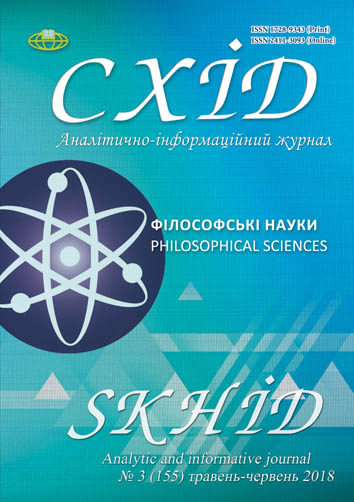Basic approaches to the definition of the concept of "videogame" as an element of modern scientific discourse
DOI:
https://doi.org/10.21847/1728-9343.2018.3(155).139675Keywords:
game, videogame, concept, discourse, "homo ludens", gaming, gamologyAbstract
The article explores the concept of "videogame" as a narrative of modern social and philosophical thought, which considers a video game through the prism of the gaming of social and individual life of a person. It is emphasized that despite the active penetration of videogames into the life of a person, a general concept of a "videogame" has not yet been formed in scientific discourse that would comprehensively cover this phenomenon, reflect its specific features and determine the further directions of research. It is proposed to supplement the concept of "videogames" with the following characteristics: 1) Videogame becomes new cultural phenomenon, one of parts of the mass culture and art of the modern world; 2) Videogame forms not only a virtual world, virtual space. Nearby the virtual space of game forms special society, also in this space can be formed special culture, ethic and morality that modifies real standards; 3) Videogame may be merely game for fun; however, it also can bring some ideas: philosophical, political etc.; 4) Interactive in videogames depends on a genre or platform of the game. "Videogame" concept should include not only indication of interactive, but also capability of levels and variety of interaction between game and player; 5) "Videogame" concept should describe videogame as complex phenomenon that have positive and negative aspects. Emphasizing on one side may reduce concept. It is concluded that the video game will become a new cultural phenomenon, part of the mass and artistic culture of the twentieth century. The expansion of the currently available concept "videogame" can bring closer the formation of a stable scientific concept, which will become the foundation for the development of a scientific discourse on the study of gaming as a general theory of videogames.Downloads
References
Djaouti D., Alvarez J., Jessel J-P. 2008. Agameplay definition through videogame classification. Hindawi Publishing Corp., 4:1-4:7.
Egenfeldt-Nielsen S., Smith J.H., Tosca S.P. 2008. Understanding Video Games: The Essential Introduction. Routledge, New-York andLondon: 293 p.
Esposito N. 2005. AShort and Simple Definition of What a Video Game Is. Proceedings of DiGRA 2005 (Changing Views: Worlds in Play).Vancouver (Canada), 16-20 juin.
Granic, I., Lobel, A., & Engels, R.C. 2014. The benefits of playing video games. The American psychologist, 69/1. Р. 66-78.
Horban O., Martych R. 2017. Basic approaches to the definition of the essence of the concept of «living». Studia Warminskie. №54: 93-103.
Sicart, M. 2009. The Ethics of Computer Games. MA: MIT Press,Cambridge. 264 p.
Alieva, Olga; Zhukova, Marina. 2016. Virtual games as culture phenomenon of modern. Skhid, n. 5(145): 64-67. DOI: 10.21847/1728-9343.2016.5(145).83810.
Gupalovska, V. 2012. Adictation as a form of dependent behavior: the problem of definition. Bulletin of the Kiev National University. Taras Shevchenko. Psychology. Pedagogy. Social work. No. 4: P. 6-10 (ukr).
Dodonov, R. 2014. To the ontological status of information. Bulletin of Donetsk National University Series B: The Humanities. No. 1-2: 411-418.
Ilnytska, L. A. 2011. Ways of psychological support of persons dependent on the Internet in the juvenile age. Science and Education: Sciences. Prekt. journ south of sciences Center NAPN Ukraine. No. 11 (Psychology): 57-61 (ukr).
Kislyuk, K. 2014. Perspectives of computer games in the media culture of the XXI century. Culture of Ukraine. 2014. Vol. 47: P. 40-48.
Koblevsky, A.V., Khovrich M.O. 2016. Computer games and programs as a means of educational process in a secondary school. Bulletin of the Chernihiv National Pedagogical University. Series: Pedagogical Sciences. Issue 137: 230-233.
Nosov, N.A. 2000. Dictionary of virtual terms. Proceedings of the Laboratory of Virtualistics. Vol. 7. Proceedings of the Center for career guidance.Moscow: «The Way», 2000. 69 p.
Stepanov, V. V. 2013. Computer games as a subject of ethics and ethical systems as an in-game element. Young Scientist. № 11: 857-861. Available at: https://moluch.ru/archive/58/8011/.
Stratonova, N. 2014. Self-identification of the person in the virtual space of the game. Scientific Bulletin of the East European National University named after. Lesia Ukrainka: Philosophical Sciences (Lutsk) № 16 (293): 37-43.
Fedorov, A.V. and Charcot, V.D. 2011. Computer game «First Million» as an element of the learning environment «Atomic Physics». Information technology in education. Vol. 10: 34-40.
Huizinga, J. 1997. Homo Ludens; Articles on the history of culture [translat.] Progress - Tradition,Moscow, 416 p.
Downloads
Published
How to Cite
Issue
Section
License
Copyright (c) 2018 Olexandr Horban, Maria Maletska

This work is licensed under a Creative Commons Attribution-NonCommercial-NoDerivatives 4.0 International License.
1. Authors bear responsibility for the accuracy of facts, quotations, numbers and names used.
2. Manuscripts are not sent back.
3. The publisher does not always agree with the authors' opinion.
4. The authors reserve the right to authorship of the work and pass the first publication right of this work to the journal under the terms of a Creative Commons Attribution-NonCommercial-NoDerivatives 4.0 International License. This license allows others to distribute (copy) the published work for non-commercial purposes, provided there is mandatory attribution to its authors and a link to the first publication in our journal.
5. The authors have the right to conclude separate supplement agreements that relate to non-exclusive work distribution in the form in which it has been published by the journal (for example, to upload the work to the online storage of the journal or publish it as part of a monograph), provided that the reference to the first publication of the work in this journal is included.

